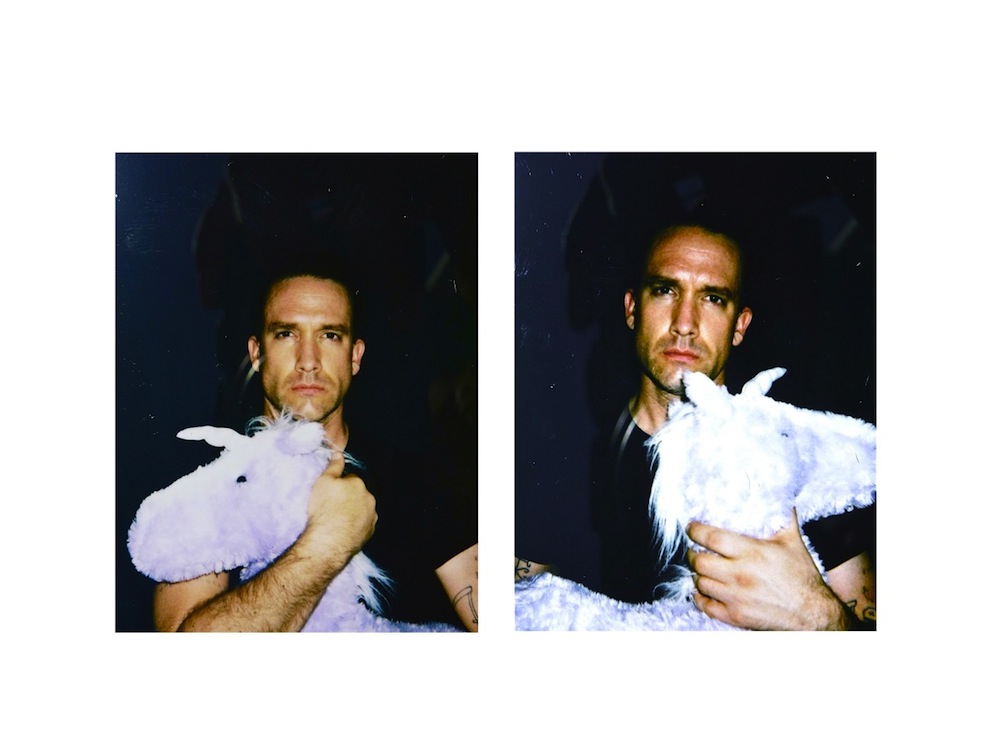Xiu Xiuâ??s Pop Madness

With each new album, Xiu Xiu, the difficult to quantify, shape-shifting, and wholly experimental rock band, goes where no band dare tread. Led by Los Angeles-based musician Jamie Stewart, the band’s founder and one permanent member, Xiu Xiu’s music has consistently resisted definition—though a penchant for serious darkness (sonically and lyrically) has been the one running streak and defining characteristic. A Xiu Xiu lyric taken out of context (“If you leave, no one will find my corpse”; “Your father was the first man inside of you”) might seem laughably macabre, but in the timbre of Stewart’s voice—sometimes angry, sometimes vulnerable—alongside smashing synths or haunting echoes, the words lodge themselves in the brain, like a spooky half-remembered dream.
Today they release their 13th album, Forget (Polyvinyl), which features Stewart and longtime bandmates Shayna Dunkelman and Angela Seo. Stewart is coming off a busy two years since their last studio album, 2014’s Angel Guts: Red Classroom, including a cover album—Xiu Xiu Plays the Music of Twin Peaks, which is exactly what it sounds like—and film scoring work, including for John Cameron Mitchell’s upcoming How to Talk to Girls at Parties. After some technical difficulties regarding placing an international call, Interview reached Stewart at his hotel in Milan, where he’s in the midst of a European tour with HEXA, the punk band he plays with on the side. Topics of discussion include the new album, collaborators (chief among them Vaginal Davis), performing live, Alaskan oil drilling, and birdwatching. How predictably unpredictable.
MATT MULLEN: You’ve been incredibly busy lately—the Twin Peaks music, the John Cameron Mitchell movie, HEXA. How has it felt to have such a creatively verdant three years, and do you ever worry that the pendulum is going to swing the other way?
JAMIE STEWART: At this moment, it just feels fortunate. I feel almost magically lucky in that I have had the chance to work with a large number of people who, since I was teenager, have been heroes of mine. As far as the pendulum swinging the other way, that can happen in any aspect of anyone’s life at any time. That happens with making toast, you know? Xiu Xiu has been a band for 15 years—which makes me want to barf every time that I say it—but I remember the first time that the pendulum swung the other way, I was sitting in my car weeping, saying over and over to myself, “I’m a failure. I’m a failure.” It happens to everyone. It goes back the other way, if you don’t quit. My father was a musician also and some of the best advice he gave me applied specifically to this situation. He said something along the lines of, “Things are going to go, but music will be there and you can quit or not, the music will never go away.”
MULLEN: So where do you get inspiration now? Or the energy to keep loving music?
STEWART: Some of it comes from absorbing and being moved by other art or music or film or literature that other people make. Some of it comes from the really almost terrifying need to stay immersed in it, to potentially organize the rotten parts of existence and approach it rather than be destructive. I think inspiration essentially comes from listening and paying attention—allowing one to be led rather than always needing to be in control. That sounds preposterous and extraordinary.
MULLEN: This album is being called your most pop-oriented and your most accessible—which almost makes me laugh, because compared to mainstream pop this is totally different. But when you consider it in the canon of your work, it is a slightly different direction. A. Do you even agree with that? And B. Was that intentional? If so, why?
STEWART: We did not enter into this with pop in mind. I mean, in the past we have. There are other records where we very pointedly listened to a ton of Top 40. For this, the person that we really leaned on really hard as a big song engine is the producer Joe Meek. Do you know him?
MULLEN: The name sounds familiar.
STEWART: In the late ’50s and early ’60s, he is the person who essentially created the idea of experimentation in the studio. Like, he created the idea of artificial reverb and artificial echo, and he really pioneered the use of an excessive amount of compression and chord for an effect. So he would take a kind of boring proto-rock-and-roll song and excessive pre-rock-and-roll song and he would put all of these bizarre treatments on it and make it this extraordinary sonic and original thing. We were thinking more about that rather than pop. He was kind of a progenitor of pop more than a pop person. He was an incredibly troubled person. You know, he murdered his landlady.
MULLEN: So all that being said, pop is clearly way too reductive of a term to apply to this album.
STEWART: For me, personally it is, but if somebody sees that in it, I wouldn’t refute that. This is going to make me sound like a total prick, but the pursuit of accessibility is essentially the pursuit of drilling oil in Alaska. It’s kind of extraordinarily selfish, I think, and no one will get anything along the lines of the pursuit of accessibility.
MULLEN: I want to mention the last track on the record, “Faith, Torn Apart.” It’s so ambitious and weird and out of all the tracks it stuck with me the most. What was the writing process like for that one specifically?
STEWART: I’m glad to hear you say that. I think that’s my favorite on the record.
MULLEN: How come?
STEWART: In a completely personal way, I think because it was the most collaborative song that we have ever done and the people who collaborated on it are amongst my ultimate, ultimate, ultimate music heroes of all time. Greg Saunier from Deerhoof is on it. Charlemagne Palestine is on it. Vaginal Davis, who more than anybody else in the entire world shaped my specific view; Father Murphy, who is this tragically underappreciated Italian psychedelic band; and then Shayna and Angela from Xiu Xiu, without whom I would be dead, worked on it all.
MULLEN: How did Vaginal Davis come into the fold?
STEWART: It’s a super long story and I’ll try to make it succinct. When I was a teenager growing up in Los Angeles, I lived in the suburbs and I would occasionally drive my parents’ station wagon into the real Los Angeles and explore. I came across this fanzine that even at the time was out-of-print, and there was an article about a band she was in called Black Fag, and I opened the page and there was this picture of Vaginal Davis that was at once both extraordinarily masculine and extraordinarily feminine. Being queer, pre-Obama and at the height of AIDS, I mean, not that it’s not complicated now, but it was extraordinarily complicated at that time, and so to see it mixed in with punk and performance and also humor and vulnerability … I opened one page and my brain completely exploded. It was like every answer I needed all at once through one person’s band. And then several years after that this band I was playing in played at this night she used to host in L.A. called Club Sucker, and she would kind of hassle the bands before the played. Things got a little out of hand and at one point on stage she stuck a drumstick up my ass. I was very nervous. [laughs] And then Jonathan Berger, who is a curator and an artist friend of mine, and a professor at NYU, asked me to give a talk to his class and he mentioned Vaginal Davis was a friend of his and she remembered the drumstick incident.
MULLEN: Oh, wow.
STEWART: I told him, “Oh, please tell her hi.” He told her hi. And then a couple years after that he put together this idea of doing a reworking of The Magic Flute with Vaginal Davis and Xiu Xiu doing the music for it, and we did that in 2015. After 20-odd years we finally really got to know each other. It’s been an incredibly long journey.
MULLEN: So much of Xiu Xiu and your work is collaborative. How you go about choosing collaborators?
STEWART: I am completely work-obsessed and say yes to almost everything. In a totally non-dramatic way, I absolutely and profoundly, deeply love playing music and any chance to do it is always a really wonderful experience, and 95 percent of the collaborations have been people I’ve either been friends with or admired from afar. It’s an incredibly long list.
MULLEN: Do you go into your own universe when you’re performing on stage or is it a symbiotic relationship with the audience?
STEWART: I think it’s kind of both. I need to keep my eyes closed the entire time, with the exception of moving from place to place to keep from tripping. Anytime I look at anybody there, I get really thrown off. I think that comes from a ridiculous teenage version of shyness. But at the same time—and I think it’s true for anyone one who plays—when you are playing in an honest and true way and the people who are there are connecting with that, you are playing better. But other than, “Hello, thank you and goodnight,” I think any other talking I do is lyrical everything. [laughs]
MULLEN: What are your other hobbies besides making music?
STEWART: [laughs] My other hobbies are typical and dorky—typical among a lot of other musicians, that is. I’m super into movies and literature and going to museums. And then I’m an avid and almost embarrassingly devoted birdwatcher. That is probably my big hobby. A lot of musicians that I know are avid birdwatchers. Jonathan Meiburg from the band Shearwater, his band is actually named after a bird. He has a PhD in Ornithology. Lawrence English, he’s also an avid birdwatcher, too, and Angela from Xiu Xiu. It makes sense. It’s an auditory and temporal pursuit, as with music.
FORGET (POLYVINYL) IS OUT TODAY, FEBRUARY 24, 2017. FOR MORE ON XIU XIU, VISIT THEIR WEBSITE.






